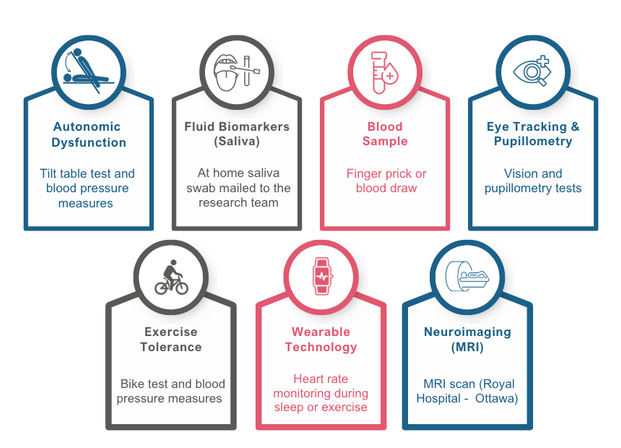Research Projects
Our work represents a collaborative effort driven by a passion for advancing concussion research and enhancing the lives of individuals impacted by concussions

Research Studies
Our research is actively recruiting 5,500 participants over 5 years all of whom will be seen for a concussion at one of three 360 Concussion Care Clinic locations across Ontario, Canada.
We will collect injury and lifestyle information from all participants and some participants will take part in extra tests (known as sub-studies) that will study:
-
their physical activity and how well they can exercise
-
how their body responds to stress
-
how their vision and balance is working
-
how they report their mental health and sleep
-
images of their brain scans, and
-
perform tests of their blood or saliva
All participant data will be shared through a large research database run by the Ontario Brain Institute. This will be one of the biggest collections of concussion data ever gathered, and by making the information available to other scientists, the study will help improve concussion research and encourage collaboration.
We have published our research protocol and you can visit our Publication page to read the scientific article. You can also see our participant pathway below.

Overview of Sub-Studies

Below is some key information regarding our sub-studies:
How Participants Contribute to Research
By taking part in our research projects, participants help us learn more about how concussions happen, how they affect people, and how to treat and prevent them. Whether it's answering questions, doing tests (like bike or blood tests) or trying new technologies, every participant plays an important role in helping us advance concussion research and care. All potential participants, recruited through the 360 Concussion Care Clinics, will be provided with information about the studies and will need to consent to participate. Participation in studies is always optional.

On-going Community Engagement Studies
Living Guideline for Pediatric Concussion
The Living Guideline for Pediatric Concussion shares up-to-date, evidence-based clinical recommendations & tools for healthcare professionals, families, teachers and coaches for recognizing and managing children and adolescents with concussions. The impact and reach of the Living Guideline as well as the Guideline development are being researched.

Concussion Priority Setting Partnership

The Concussion Priority Setting Partnership was formed to identify key priority research topics in concussion. These priority questions were developed through stakeholder feedback (for example, parents, coaches, and individuals with lived experience) and consultation with experts. These priority questions guided the research questions for the TRANSCENDENT program.
Youth Concussion Awareness Network (You-CAN)
The You-CAN program empowers youth as leaders in concussion education in their school and sports communities by having them design and lead concussion awareness campaigns to increase concussion knowledge and awareness. The feasibility, acceptability and impacts of You-CAN are being researched.
